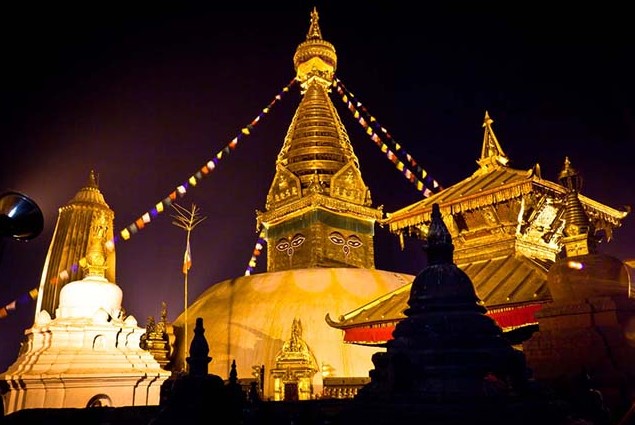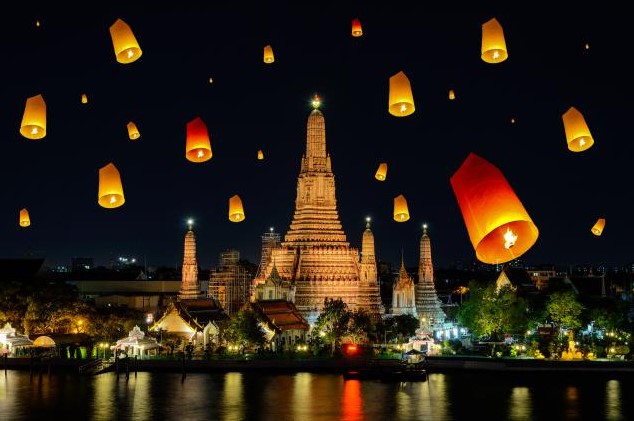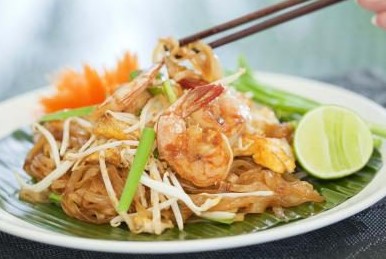
Buddhist festivals and special days celebrations are always joyful events. Typically on a festival day, lay people go to the local temple or monastery and offer food to the monks. They take the Five Precepts and listen to a Dharma talk. In the afternoon, they distribute food to the poor to make merit, meaning doing good things as mentioned in religious doctrine. In the evening they may join a ceremony of “circumambulation a stupa” the act of going around an object of veneration, such as a stupa (a monument which houses holy relics of the Buddha or great Sangha masters). The day will conclude with evening chanting of the Buddha’s teachings and meditation.
The most significant of the festivals and special days in the Thai Buddhist calendar is the night of the full moon in May. “Buddha Day” known as Vesak or Visakah Puja, sees the worldwide Buddhist community celebrate the birth, enlightenment and death of the Buddha. Here are some other important festivals and special days:
Buddhist New Year
The Buddhist New Year depends on the country of origin or ethnic background of the people. It is celebrated for three days from the first full moon day in April, the first full moon day in January or late January or early February according to the lunar calendar.
Magha Puja Day
On the full moon day of the third lunar month (March), the Buddhist community commemorates the time when more than twelve-hundred enlightened saints known as Arahats, all ordained by the Buddha himself, assembled without any prior call.
Asalha Puja Day
Commemorates Buddha’s first teaching, the day Buddhism was established. It is usually celebrated with readings and meditation on Buddhist scriptures.
Uposatha
The four monthly festivals and special days are the new moon, full moon and quarter moon days acknowledged in Theravada countries, countries that follow a conservative branch of Buddhism that uses Buddha’s teaching preserved in the Pāli Canon.
Pavarana Day
The Buddhist community marks the end of the rainy season and the end of the 3 lunar months of Vassa, or “Buddhist Lent”, on Pavarna day.

Kathina Ceremony
Within one month of the Pavarna day, the kathina ceremony is held, during which the laity gather to make formal offerings of robe cloth and other requisites to the monks.
Anapanasati Day
At the end of one Vassa, the Buddha was so pleased with the progress of the assembled monks that he encouraged them to extend their retreat for yet another month. On the full-moon day marking the end of that fourth month of retreat, he presented his instructions on mindfulness of breathing (anapanasati).
Abhidhamma Day
This day celebrates the occasion when the Buddha is said to have gone to the Tushita Heaven to teach his mother the Abhidhamma.
Songkran
This Thai Buddhist festival goes on for several days during the middle of April. People gather around the riverbank, carrying fishes in jars to put into the water and also splash each other.
Loy Krathong
When the rivers and canals are full of water, in Thailand on the full moon night of the Twelfth Lunar month, people bring bowls of flowers made from leaves, candles and incense sticks to float them in the water, to take bad luck away.
The Ploughing Festival
This festival celebrates the Buddha’s first moment of enlightenment, when he had gone with his father to watched the ploughing at the age of seven. When the moon is half-full in May, two white oxen pull a gold painted plough, followed by four girls dressed in white who scatter rice seeds from gold and silver baskets.
Ulambana
The Thai Buddhist Calendar has the first to fifteenth days of the eighth lunar month as the days the gates of Hell are opened and ghosts may visit the world. Food offerings are made during these special days to relieve the sufferings of these ghosts. On the fifteenth day, Ulambana or Ancestor Day, people visit cemeteries to make offerings to the departed ancestors. In Japan this festival is known as Obon and begins on the thirteenth of July for three days.
Avalokitesvara’s Birthday
Celebrates the Bodhisattva ideal represented by Avalokitesvara on the full moon day in March.

 Invented in the 1930s by a Chinese-Thai chef, this dish of thin rice noodles stir-fried with egg, tofu and shrimp, and seasoned with fish sauce, sugar, tamarind, vinegar and dried chilli has subsequently reigned as the poster boy for Thai cuisine.
Invented in the 1930s by a Chinese-Thai chef, this dish of thin rice noodles stir-fried with egg, tofu and shrimp, and seasoned with fish sauce, sugar, tamarind, vinegar and dried chilli has subsequently reigned as the poster boy for Thai cuisine.
